June 8, 2011
An Education
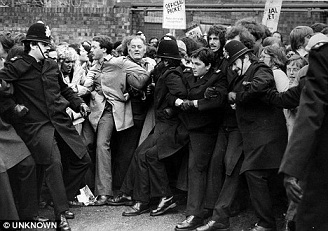
Thanks, Jenny, you made it all possible
This is the movie poster for An Education:
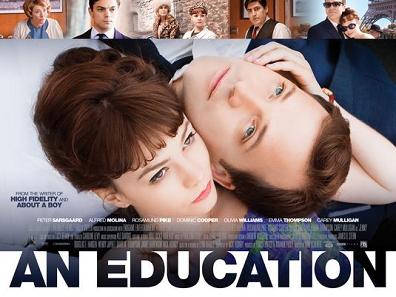
If this looks terribly adorable, then there are spoilers below. If not, then there are no spoilers below. Take a minute and think it over.
The movie is about a 16 year old girl in 1961 Britain, in her final year of "gymnasium" or A-Levels or sixth form or whatever they call it over there, wanting to "read English at Oxford."
Her father, an unsophisticated, stuffy, and concrete man, wants her to go to Oxford. Period. Not learn Latin or study mathematics or play the cello-- which he insists she do-- but do those things solely because they will get her into Oxford. He relaxes in a suit and tie and drinks only on Christmas. In other words, he's an American parent. Yes, just like Amy Chua, which is why your reactions to them are identical.
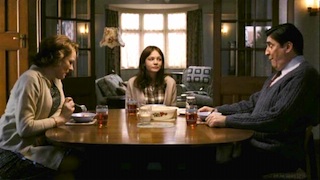
She wants to go to Oxford, too, but is perplexed and resistant to the purposeless of her life so far. Is the only point of cello just to impress the Oxford interviewer? She wants to live, read books and listen to jazz, go to Paris and Rome, eat good food in restaurants. That's a quote.
It helps that a) she is extremely pretty with not one single hint of threatening sexuality-- so that women in the audience can identify with her; and b) super-intelligent and witty, so that the same women can assume that because of a), they are also b.) It also give the male audience a comfort zone-- since she's not sexy, there's nothing creepy about me liking her. The absence of sexiness is vital to the misunderstanding of the movie, and to its appeal. We'll come back to this.
This is a movie about teenage rebellion, in the past. Whenever teen rebellion is depicted in present day, it's teen becoming worse. When teen rebellion is depicted in the past, it's teen trying to be better. NB: movies are made by adults who have kids.
So our mythic hero receives The Call to Adventure. I'm going to try to describe it in the most neutral language possible, so as not to influence you, but I'm going to fail. Sorry in advance.
As she's standing in the rain one day, a man, about 35, in a purple sportscar drives up and offers her a ride home.
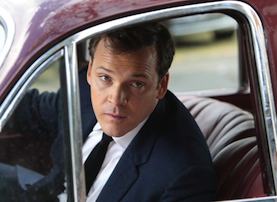
At first it's platonic, but gradually they fall for each other. He is sophisticated, worldly, eventually takes her to Paris, loves the Pre-Raphaelites, likes both jazz and classical, is the perfect gentleman. He has two equally worldly friends, a couple, and the three of them introduce her into a world full of life. The one she longs for.
But at the midpoint the plot twist comes: he's a thief. And a slum lord. And married. And now we get to see that she's been tricked into throwing her future away for something that isn't real.
The question for you reading this right now is whether this is a "plot twist," or is this "duh"? The movie makes his duplicity be the reason the relationship fails. But the relationship was doomed immediately, duplicitous or not, from the moment this psychopath pulled up in a sportscar and asked a 16 year old to get in. Of course I understand why she'd fall for it, but that doesn't mean the audience is supposed to fall for it. In my imagination, the audience is looking at each other like wtf? seriously? But if the internet is any guide, people reacted to this as if it was a puppy rescue on CNN.
"So what, if I see a 16 year old standing in the rain in my suburban neighborhood, I can't give her a ride home?" It's very simple: if you're nervous about it, for her sake let her catch a death of cold. Just because bin Laden was married to a 16 year old doesn't mean it's okay for you.
I've watched the movie twice to be sure I'm not insane, though admittedly this is not a valid test. Yes, they slowly drop small hints that he's not who he seems, but I am certain that in the beginning, the viewer is not supposed to detect anything wrong with their relationship. The only reason I assumed that the three of these sophisticates must also be cannibals is because I, me, can't believe that three adults who lure a 16 year old girl into their fold wouldn't obviously be cannibals. My personal bias.
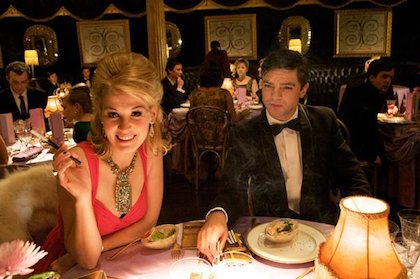
The point I am making here is that this is decidedly not the bias of the filmmakers, and that is very, very, very creepy. And lazy. Didn't they see Twilight before they shot a remake of it?
II.
If David's arrival on screen is creepy, the father's presence is nothing short of preposterously offensive.
The movie wants you to see that he only cares about appearances, not her soul. He is the worst, utterly the worst, thing a Hollywood director can imagine: he is bourgeois. Here's a media protip: the words "bourgeois" and "American" are always completely interchangeable.
In being this, he is blind to his daughter's true nature and an accessory to child rape. He grills and insults some poor teen who asks her out, but because David is a higher class person, he doesn't try to find out anything about him, doesn't ask if he's on a list, lets him take Jenny out late and on overnight trips. He practically shaves her vagina for him. The father never even asks David's last name. In fact, his only reservation about David is that he is... wait for it... Jewish. Oh, no matter, David charms the anti-semitism right out of him. Yes, it was that easy.
Naturally, when it is discovered that David is married, her dad gets angry. He wants a confrontation, so he mans up: "right, if you won't do it, I will. I'm still your father."
"Oh, you're my father again, are you?" she says in the only line that makes sense in the whole movie. "What were you when you were encouraging me to throw my life away? Silly schoolgirls are always being seduced by glamorous older men, but what about you?"
That's your life lesson. The unique problem of raising kids is that not only will they hate you for not letting them do stuff, they will hate you for letting them do stuff they later regret. Choose accordingly.
III.
I don't blame 16 year old Jenny for falling for the charismatic and sophisticated older man, of course I get it. And, to a point, I am not even surprised that the parents fell for him either; they wanted "the best" for their daughter, and he looked like the best. I can't do anything about misreading a stranger.
But what is their fault is that they misread Jenny. They never listened to Jenny's words. They may be good or bad people, but they failed as parents in this specific way.
Every time she explains why she loves David, or why she wants to marry him, or leave school, she says something like this:
"I want to read books, and listen to jazz, and go to Paris and Rome, and eat good food in restaurants."
None of those things are descriptions of David. She may think she loves him, but to anyone who listens to her words it's clear she loves the world he offers. That's not a reason to love anyone, in fact, it is proof you do not love him. However much the parents want her to "marry well," they should have heard these words and realized that she didn't love him and that it inevitably wouldn't last. That was their responsibility. David, if he was any kind of man, should have noticed and let her go. And any intelligent women seduced by the prospect of a man's new world should describe her happiness in three sentences and count how many times his name comes up, and then return the ring.
IV.
The movie pulls off a clever trick: even after you learn David is a cad and a liar, you don't really ever hate him. And that's because you all Anglos have forgotten how to hate. You think your lack of hate is a evidence of your own sophistication and maturity; just as Jenny doesn't hate him, she goes beyond him, you do, too. But you're not being honest.
Imagine the exact same movie, everything the same, but filmed entirely from his perspective. He sees a girl in the rain, and makes his move. Now you easily hate him, now you see him as a bad person. So why the change of heart?
Similarly, if Jenny had been portrayed as superintelligent and witty but also as extremely hot-- that single change and no other, e.g. played by Megan Fox, you would have immediately detected the corruption at the center of the movie and stoned David and his purple car.
So the reason you don't hate him in An Education is because you are deliberately not seeing reality objectively, you are choosing to see it entirely from her eyes, or have so identified with her that they are your eyes, which makes David merely a supporting character. That inability to value people as individuals, good or bad, to appraise their worth independent of yourself, is a characteristic which is excusable in a 16 year old girl, and inexcusable in anyone else.
V.
It's evident to me that the filmmakers did not understand the true meaning of the tale they were telling, and I soon discovered why: they were telling a tale that had already been told by someone else. Lynn Barber, a writer for the Observer, wrote the original story about her own experience as a 16 yo Oxford wannabe falling for an empty Tiffany's box. The stories are very similar, except for their final lines. This is how the movie ends:
Here's how Barber's story ends:
Barber grew up. Jenny didn't. But the movie thinks she did. The movie is called "An Education", but Jenny didn't get one. She is like so many other women who have deceived themselves into thinking they are wise. She's still in her movie, ready for a sequel, same as the original. Jenny won't ever be happy; fortunately for her, she's not real.

If this looks terribly adorable, then there are spoilers below. If not, then there are no spoilers below. Take a minute and think it over.
The movie is about a 16 year old girl in 1961 Britain, in her final year of "gymnasium" or A-Levels or sixth form or whatever they call it over there, wanting to "read English at Oxford."
Her father, an unsophisticated, stuffy, and concrete man, wants her to go to Oxford. Period. Not learn Latin or study mathematics or play the cello-- which he insists she do-- but do those things solely because they will get her into Oxford. He relaxes in a suit and tie and drinks only on Christmas. In other words, he's an American parent. Yes, just like Amy Chua, which is why your reactions to them are identical.

She wants to go to Oxford, too, but is perplexed and resistant to the purposeless of her life so far. Is the only point of cello just to impress the Oxford interviewer? She wants to live, read books and listen to jazz, go to Paris and Rome, eat good food in restaurants. That's a quote.
It helps that a) she is extremely pretty with not one single hint of threatening sexuality-- so that women in the audience can identify with her; and b) super-intelligent and witty, so that the same women can assume that because of a), they are also b.) It also give the male audience a comfort zone-- since she's not sexy, there's nothing creepy about me liking her. The absence of sexiness is vital to the misunderstanding of the movie, and to its appeal. We'll come back to this.
This is a movie about teenage rebellion, in the past. Whenever teen rebellion is depicted in present day, it's teen becoming worse. When teen rebellion is depicted in the past, it's teen trying to be better. NB: movies are made by adults who have kids.
So our mythic hero receives The Call to Adventure. I'm going to try to describe it in the most neutral language possible, so as not to influence you, but I'm going to fail. Sorry in advance.
As she's standing in the rain one day, a man, about 35, in a purple sportscar drives up and offers her a ride home.

At first it's platonic, but gradually they fall for each other. He is sophisticated, worldly, eventually takes her to Paris, loves the Pre-Raphaelites, likes both jazz and classical, is the perfect gentleman. He has two equally worldly friends, a couple, and the three of them introduce her into a world full of life. The one she longs for.
But at the midpoint the plot twist comes: he's a thief. And a slum lord. And married. And now we get to see that she's been tricked into throwing her future away for something that isn't real.
The question for you reading this right now is whether this is a "plot twist," or is this "duh"? The movie makes his duplicity be the reason the relationship fails. But the relationship was doomed immediately, duplicitous or not, from the moment this psychopath pulled up in a sportscar and asked a 16 year old to get in. Of course I understand why she'd fall for it, but that doesn't mean the audience is supposed to fall for it. In my imagination, the audience is looking at each other like wtf? seriously? But if the internet is any guide, people reacted to this as if it was a puppy rescue on CNN.
"So what, if I see a 16 year old standing in the rain in my suburban neighborhood, I can't give her a ride home?" It's very simple: if you're nervous about it, for her sake let her catch a death of cold. Just because bin Laden was married to a 16 year old doesn't mean it's okay for you.
I've watched the movie twice to be sure I'm not insane, though admittedly this is not a valid test. Yes, they slowly drop small hints that he's not who he seems, but I am certain that in the beginning, the viewer is not supposed to detect anything wrong with their relationship. The only reason I assumed that the three of these sophisticates must also be cannibals is because I, me, can't believe that three adults who lure a 16 year old girl into their fold wouldn't obviously be cannibals. My personal bias.

The point I am making here is that this is decidedly not the bias of the filmmakers, and that is very, very, very creepy. And lazy. Didn't they see Twilight before they shot a remake of it?
II.
If David's arrival on screen is creepy, the father's presence is nothing short of preposterously offensive.
The movie wants you to see that he only cares about appearances, not her soul. He is the worst, utterly the worst, thing a Hollywood director can imagine: he is bourgeois. Here's a media protip: the words "bourgeois" and "American" are always completely interchangeable.
In being this, he is blind to his daughter's true nature and an accessory to child rape. He grills and insults some poor teen who asks her out, but because David is a higher class person, he doesn't try to find out anything about him, doesn't ask if he's on a list, lets him take Jenny out late and on overnight trips. He practically shaves her vagina for him. The father never even asks David's last name. In fact, his only reservation about David is that he is... wait for it... Jewish. Oh, no matter, David charms the anti-semitism right out of him. Yes, it was that easy.
Naturally, when it is discovered that David is married, her dad gets angry. He wants a confrontation, so he mans up: "right, if you won't do it, I will. I'm still your father."
"Oh, you're my father again, are you?" she says in the only line that makes sense in the whole movie. "What were you when you were encouraging me to throw my life away? Silly schoolgirls are always being seduced by glamorous older men, but what about you?"
That's your life lesson. The unique problem of raising kids is that not only will they hate you for not letting them do stuff, they will hate you for letting them do stuff they later regret. Choose accordingly.
III.
I don't blame 16 year old Jenny for falling for the charismatic and sophisticated older man, of course I get it. And, to a point, I am not even surprised that the parents fell for him either; they wanted "the best" for their daughter, and he looked like the best. I can't do anything about misreading a stranger.
But what is their fault is that they misread Jenny. They never listened to Jenny's words. They may be good or bad people, but they failed as parents in this specific way.
Every time she explains why she loves David, or why she wants to marry him, or leave school, she says something like this:
"I want to read books, and listen to jazz, and go to Paris and Rome, and eat good food in restaurants."
None of those things are descriptions of David. She may think she loves him, but to anyone who listens to her words it's clear she loves the world he offers. That's not a reason to love anyone, in fact, it is proof you do not love him. However much the parents want her to "marry well," they should have heard these words and realized that she didn't love him and that it inevitably wouldn't last. That was their responsibility. David, if he was any kind of man, should have noticed and let her go. And any intelligent women seduced by the prospect of a man's new world should describe her happiness in three sentences and count how many times his name comes up, and then return the ring.
IV.
The movie pulls off a clever trick: even after you learn David is a cad and a liar, you don't really ever hate him. And that's because you all Anglos have forgotten how to hate. You think your lack of hate is a evidence of your own sophistication and maturity; just as Jenny doesn't hate him, she goes beyond him, you do, too. But you're not being honest.
Imagine the exact same movie, everything the same, but filmed entirely from his perspective. He sees a girl in the rain, and makes his move. Now you easily hate him, now you see him as a bad person. So why the change of heart?
Similarly, if Jenny had been portrayed as superintelligent and witty but also as extremely hot-- that single change and no other, e.g. played by Megan Fox, you would have immediately detected the corruption at the center of the movie and stoned David and his purple car.
So the reason you don't hate him in An Education is because you are deliberately not seeing reality objectively, you are choosing to see it entirely from her eyes, or have so identified with her that they are your eyes, which makes David merely a supporting character. That inability to value people as individuals, good or bad, to appraise their worth independent of yourself, is a characteristic which is excusable in a 16 year old girl, and inexcusable in anyone else.
V.
It's evident to me that the filmmakers did not understand the true meaning of the tale they were telling, and I soon discovered why: they were telling a tale that had already been told by someone else. Lynn Barber, a writer for the Observer, wrote the original story about her own experience as a 16 yo Oxford wannabe falling for an empty Tiffany's box. The stories are very similar, except for their final lines. This is how the movie ends:
So I went [to Oxford], and I probably looked as wide eyed, fresh and artless as any other student. But I wasn't. One of the boys I went out with-- and they really were just boys-- asked me to go to Paris with him. And I told him I'd love to see Paris. As if I'd never been.You can imagine her winking at a knowing audience.
Here's how Barber's story ends:
What did I get from Simon? An education... My experience with Simon entirely cured my craving for sophistication. By the time I got to Oxford, I wanted nothing more than to meet kind, decent, straightforward boys my own age, no matter if they were gauche or virgins. I would marry one eventually and stay married all my life and for that, I suppose, I have Simon to thank.
Barber grew up. Jenny didn't. But the movie thinks she did. The movie is called "An Education", but Jenny didn't get one. She is like so many other women who have deceived themselves into thinking they are wise. She's still in her movie, ready for a sequel, same as the original. Jenny won't ever be happy; fortunately for her, she's not real.
62 Comments